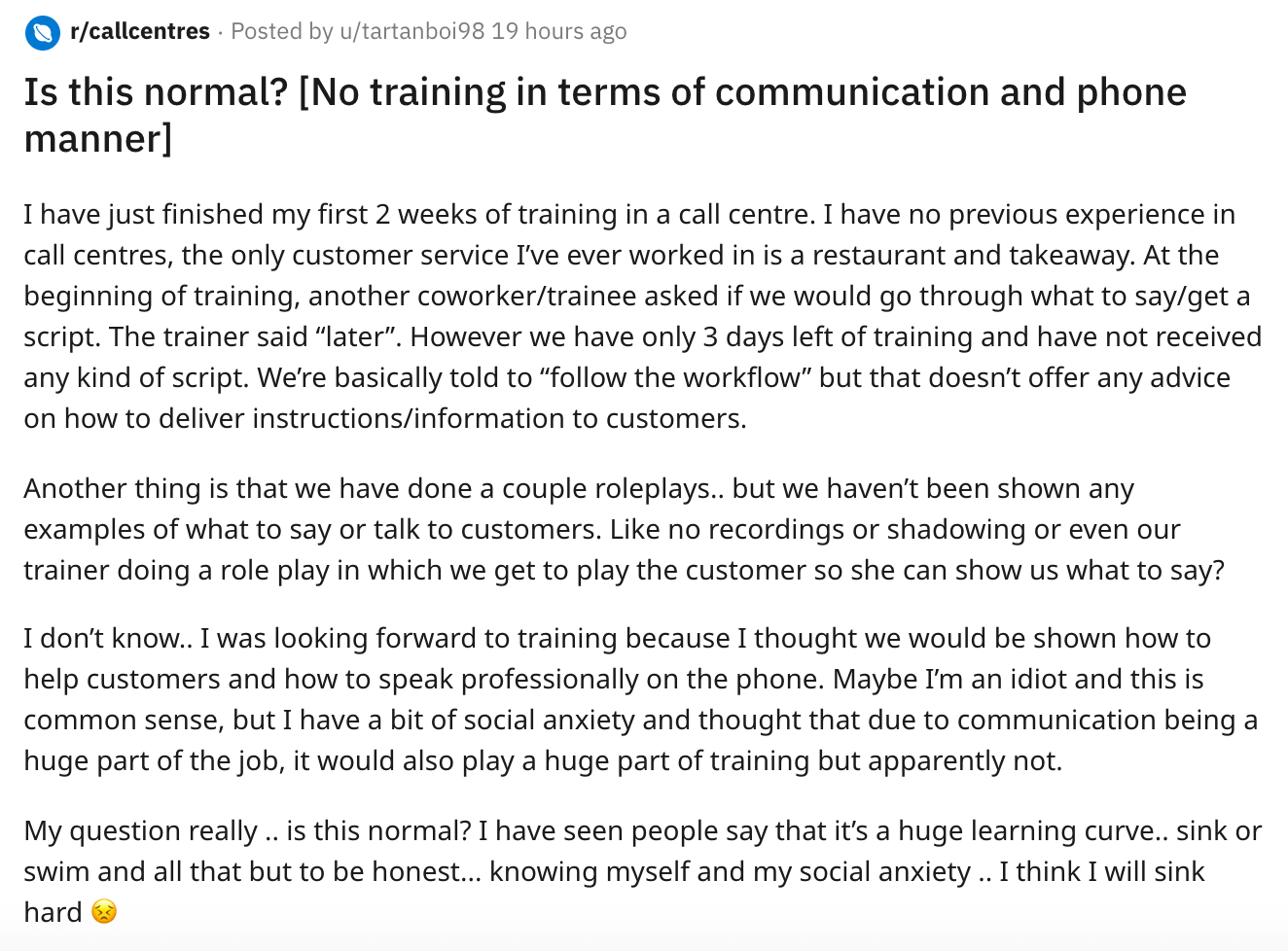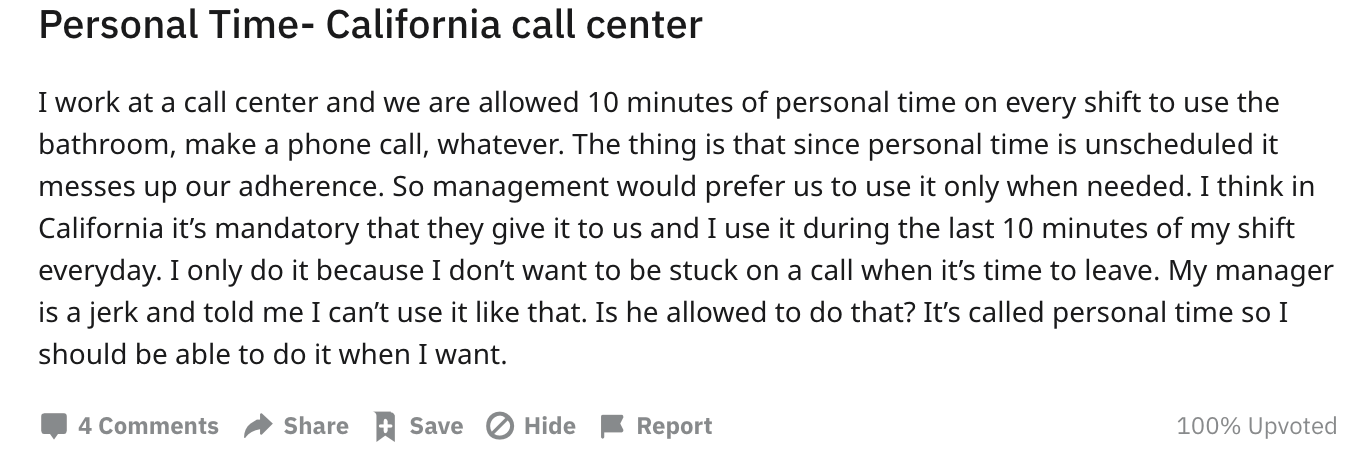![Featured Image for the blog: If Customer Service Reps Were Honest [Spooky Edition]: The Scary Reality Your Customer Service Agents Face Every Day Plus How You Can Help](https://sharpencx.com/wp-content/uploads/2020/10/8_If-CC-Employees-were-honest-spooky-edition_1020-01.png)
If Customer Service Reps Were Honest [Spooky Edition]: The Scary Reality Your Customer Service Agents Face Every Day Plus How You Can Help
This year, housebound ghouls may be faced with another tradition lost as a casualty of Covid-19. The forfeiture of familiar spooky fun and crazed sugar highs will lead to customer interactions bedeviled with strong emotions.
And, if that weren’t scary enough, we’re less than a week away from one of the most significant elections our country has ever seen. People are passionate and incredibly sensitive to the barrage of stressors hitting our population today.
Times really are scary.
And while your customer service agents are feeling the general doom of being human in 2020, they’re also shouldering the pains and frustrations of your customers. But, if your customer service reps were honest, they’re probably always feeling at least some of this doom. And that leads to burnout, lackluster experiences and, eventually, turnover.
This, my friends, is the tale of the nightmare on customer service street.
We dug through forums connecting nearly 250k agents, supervisors and managers. In each one, customer service reps weighed in with their first-hand accounts of the pains they face at work: Their nightmares.
But have no fear, this spooky story has a happy ending. And it starts with you. You have the power and influence to swoop in and end the fright with intentional coaching and training, setting and aligning expectations and developing your workforce. If your customer service reps were honest, here’s a look into what they’d say – and tips you can use to help them during this spooky season and beyond.
Some of the Ghastly Things Your Call Center Agents Endure
1. Poor training heightens agent stress and anxiety
Agents crave upfront training and feedback to feel confident in their roles. And, when they don’t get it, they feel forgotten and overwhelmed.

Your agents show up to work ready and willing to succeed. But without the right resources and support from you, manager, they flounder. And they carry two tons of unnecessary stress in the process.
[Read Next] 3 more facts your agents won’t tell you about working in a call center
How to fix it:
Set expectations with every new hire you bring to the team during onboarding. Be honest with your customer service reps about the type of training they can expect and how frequently you’ll coach them after onboarding. Map out clear goals and KPIs from the get-go, and link up your new hires with tenured agents, so they can lean on a peer if they have immediate questions or concerns.
2. Your agents are forced to take FMLA because of the crippling impacts of the all-too-common, negative work environment.
You can only handle the pressure of metrics you lack control over for so long. Scoring agents on hold times they can’t impact because you’re understaffed degrades performance. And expecting an agent to solve an interaction on first contact, when the customer they’re working with has already phoned in three times, isn’t realistic. Pile on dozens of complaining customers, and you have a recipe for burnout. The truth is, sometimes your customers’ success comes at the expense of your customer service reps’ well-being. To cope, they look for escape routes to get some mental health days.

How to fix it:
Stay in tune with how your agents feel, what they’re struggling with and if they’re overwhelmed. Put regular check-ins on the books to see how they’re doing and ask the tough questions. Ask how you need to improve as a leader, what’s frustrating your agents each week and what blockers stop them from doing their jobs. You’ll relieve some stress instantly by offering up your support. And you’ll build trust, so they feel comfortable coming to you when they need a break.
Oh, and maybe give them more than one 10-minute break per day to grab a snack and go to the bathroom.

I fear for all those agents who guzzle coffee before the start of their shift.
[Download Now] 52 questions to ask your agents during 1:1s
3. Abusive callers are real.
There’s a difference between frustration and hate. And unfortunately, your agents deal with both. It’s all too common for customers to hide behind their screens and use aggressive and abusive language as their weapon. Your agents are fed up with the poor treatment, and they’re looking to you for support.

Even worse, some 42% of people worldwide have reported a downturn in their mental health since the pandemic started. Doom scrolling sends people into a negative spiral on a daily basis. And your agents deal with the repercussions. As we stew in uncertainty, fear thrives. People operate in a stress response and let their emotions take over, heightening destructive conversations.
How to fix it:
Do something. Don’t be a leader who leaves your agents to their own devices when it comes to customers spewing hate. No one should have to put up with abuse. Ever.

Document and define what abusive language looks like and set a clear action plan for how agents can (and should) handle these types of interactions.
[Read Next] Train your agents to sound the alarm on harassment
Create guidelines around when agents can press pause on a conversation, escalate an interaction, or disconnect the customer. And as you create these guidelines, lean on your customer service reps to give honest opinions about how they’d prefer to handle these situations.
4. They’re the face of your company’s problems.
There was a time at one of my old companies a pipe burst inside our building. It took out several windows and started a fire in the building near the server room.
The alarms were screeching and our CEO was sprinting through the building ushering us all out of harm’s way. (Props to that CEO for risking his life to save ours, by the way.) Our entire company met a block away with random items we’d each grabbed off our desks on our way out the door. I snagged my laptop, while others had ping pong paddles and water bottles – clearly, our minds weren’t top-notch in the emergency situation.
When everyone was out of the building, our VP of Customer Operations found our marketing director and they got to work crafting messaging to tell customers about an emergency that took all of our customer service reps off the phones, chats and emails. Then he realized – we had no way to tell our customers. Any changes we made to our IVR had to happen through our IT team and they were busy saving our on-premises infrastructure.
After the fire department left and our team was allowed back into the building, our customer service reps were directed to tell our raging customers why we’d been unavailable for the last several hours. They had to navigate confused (and angry) customers who had tried to reach out for help, but couldn’t reach us.
Our agents were the face of our company, and they were left stranded.

How to fix it:
Proactively communicate with your customers if something’s amiss. Don’t hand the burden off to your agents. If you have an outage, work with your marketing team to get the ball rolling and inform your customers. If you’re closed for the holidays or shorten your hours, set up an IVR message to let your customers know of the upcoming changes. Think ahead and eliminate surprises where you can. And if you can’t change your IVR without tagging in IT and a host of others, maybe start investigating technology that can better meet your needs. (I might know of a good one. Hint: it’s us. We can meet your needs.)
[Read Next] Poor customer service scares your customers faster than ghosts and ghouls
5. Customers dish out some absurd requests.
There’s a reason these call center forums exist. Sure, it’s so your customer service reps can have a safe space to vent and air their honest grievances. But, it’s also to share the wacky stories that make their days memorable. While some requests may be infuriating, others are borderline laughable. Like this one.

The point? Your agents never know what they’re going to get when they plop down in their chairs for a day’s work. They have to handle bizarre requests and strange conversations. And, they have to do it all with poise or risk customer loyalty.
How to fix it:
Unfortunately, you can’t change what your customers say in conversations. But you can equip your agents with the right training to handle off-the-wall requests.
Use team meetings to surface particularly absurd customer requests and talk through how to handle these requests in the future. Roleplay customer conversations and throw out unique scenarios to see how your agents react in-the-moment. Get creative with your coaching and keep lines of communication open in case your agents need to reach out for help when they’re handling a tricky conversation.
[Download Now] Get real about coaching your agents with these 7 methods

